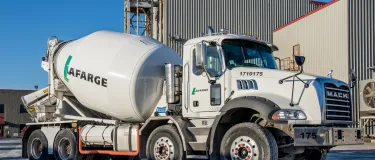The Digital Transformation of the Concrete Industry: Trend or Necessity?

By Nicolas Paradis, General Manager, Greater Montreal Area & Eastern Ontario, Lafarge Canada (East)
The ready-mix concrete (RMX) industry is currently undergoing a significant transformation in the face of evolving market demands, competitive pressures, and growing environmental concerns. At Lafarge Canada, digital transformation is more than just a trend—it is in fact becoming essential to our business. It enables us to stay competitive, enhance operational efficiency, and meet our sustainability goals. But why is this transformation so crucial to the industry as a whole?
Why the RMX Concrete Industry Needs Digital Transformation
Competitiveness Against Alternative Building Materials
The RMX concrete industry faces growing competition from alternative building materials, such as steel and timber, amongst others. To remain competitive, the RMX concrete industry must leverage digital technology to improve its efficiency, reduce costs, and enhance the quality of its products.
By embracing digital tools such as real-time tracking systems, automated batching controls, and smart dispatching systems, Lafarge Canada has optimized production schedules, reduced delivery times, and ensured consistent product quality. These improvements not only help our RMX concrete business compete with alternative materials but also attract clients seeking higher standards and more predictable results.
Addressing Workforce Shortages and Retention Challenges
The RMX concrete industry, like many others in construction, faces a shortage of skilled labor. Retaining experienced workers is also a continuous challenge due to the demanding nature of the job and an aging workforce. Digital transformation helps mitigate these issues in several ways:
- Automation: Automating repetitive tasks, such as batch processing or truck dispatching, reduces the reliance on human operators. This for example decreases operational risk in times of labor shortages.
- Skill Augmentation: Introducing technologies like artificial intelligence (AI) and machine learning enables employees to perform more advanced tasks with fewer resources, making their roles more engaging and less demanding.
- Remote Operations: Digital platforms allow for remote monitoring and management, providing more flexibility in operations.
Efficiency Gains and Carbon Footprint Reduction
Concrete manufacturing is often an energy-intensive process. At Lafarge Canada, digital transformation has been improving operational efficiency directly contributing to lower carbon emissions and a smaller environmental footprint. Here’s how RMX concrete players in general can benefit:- Optimized Production: Through the use of digital tools such as IoT sensors and data analytics, companies can optimize mixes, reduce waste, and ensure that concrete mixes are prepared precisely to specifications - minimizing excess material, energy use, and quality control resources.
- Smart Logistics: Digital route optimization and delivery tracking can reduce fuel consumption, travel, and idle times in trucks - cutting down on emissions and transportation costs.
- Predictive Maintenance: Digital monitoring of equipment allows companies to predict failures before they happen, ensuring machines operate at peak efficiency and avoiding unnecessary energy wastage due to downtime.
- Concrete Construction Monitoring: By leveraging real-time monitoring technology from Lafarge Canada's partner, EXACT, concrete parameters can be optimized during the curing process. This allows for improved mix design, reduced heating costs on the job site, and accelerated project timelines.
Enhancing Customer Experience and Satisfaction
In today’s market, clients demand greater transparency, faster service, and higher-quality products. A good example of this is Lafarge Canada’s digital platform “Concrete Direct’’ which offers real-time tracking apps, and automated reporting systems that enable RMX concrete companies to meet these expectations.
- Real-Time Tracking: Providing customers with updates on delivery schedules and product quality in real-time builds trust and improves satisfaction.
- Customized Reporting: Automated systems can generate detailed reports on concrete quality, delivery times, and environmental impact, which can be shared with clients to offer added value.
- In-App Ordering: Offering customers the ability to place orders through a dedicated mobile app can greatly enhance the customer experience. At Lafarge, with in-app ordering, our clients can request RMX concrete deliveries directly from their mobile devices, communicate through the in-app chat function, monitor order status in real-time, and make adjustments as needed. This level of convenience reduces the time spent on manual orders and ensures that orders are placed accurately, benefiting both the customer and the RMX concrete supplier.
Data-Driven Decision Making
One of the most significant benefits of digital transformation is the ability to leverage data for decision-making. By gathering and analyzing data from across the production, logistics, and customer service chain, RMX concrete companies can identify trends, optimize processes, and make strategic adjustments based on real-time insights.
- Supply Chain Optimization: Data analytics can identify inefficiencies in sourcing materials, production scheduling, or logistics, allowing companies to adjust for better cost control.
- Predictive Analytics: Data from sensors and machines can be used to predict equipment failure, optimize mix designs, or even anticipate demand trends, helping companies stay agile and proactive.
In conclusion, the digital transformation of the RMX concrete industry is no longer optional; it's essential for remaining competitive in a rapidly evolving market. With pressures from alternative building materials, workforce challenges, and the need for environmental responsibility, RMX concrete companies must embrace digital technologies to streamline operations, improve product quality, and advance sustainability. By implementing automation, data analytics, and digital platforms, RMX concrete manufacturers can position themselves for long-term success in an increasingly digital world.






